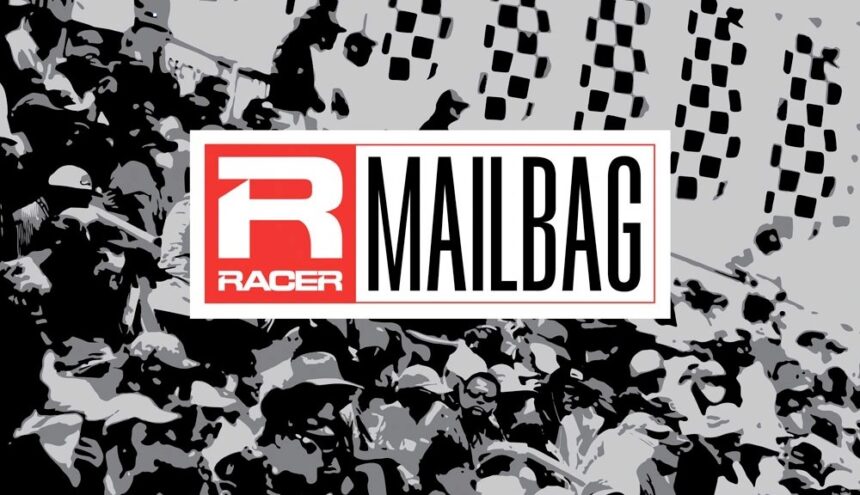Welcome to the RACER Mailbag. Questions for any of RACER’s writers may be despatched to mailbag@racer.com. We love listening to your feedback and opinions, however letters that embrace a query usually tend to be revealed. Questions acquired after 3pm ET every Monday can be saved for the next week.
Q: For many years, automotive design was all about velocity. Someday within the mid to late ‘90s, IndyCar evolution turned extra about security, reliability, and price management. Enormous positive aspects have been made in these areas, however on the expense of 25-30 years of incremental velocity evolution.
What would the vehicles seem like as we speak if they’d have been allowed to repeatedly evolve by annual engineering and design developments meant primarily to realize aggressive velocity benefits? In an ideal world, the anticipated 2027 automotive design ought to make up for as a lot of this hole as potential, a minimum of aerodynamically. That’s the automotive I’d wish to see thought-about, imagined, designed, examined, and raced.
Greg Okay.
MARSHALL PRUETT: I’m with you, Greg. Let’s do a deep dive to begin the brand new yr.
For many of IndyCar’s 100-plus years of existence, the vehicles and all the improvements and distinctive concepts they have been conceived from held the curiosity of its followers. There was no separation of the drivers and their vehicles; curiosity for what made the drivers so courageous and expert carried over to the vehicles and curiosities concerning the distinctive or boundary-pushing ideas they contained.
In contrast to a soccer or basketball, the principle instrument we use to play our sport continually modified and developed, and the interplay between our athletes and the dynamic machines they strapped into was a giant a part of the intrigue.
Even the post-WWII ‘junk’ system and the roadster period that adopted, which largely went towards the high-tech grain, have been stunning, or provided attention-grabbing takes on the identical fundamental chassis format and Offy engine package deal. A number of cool and new issues emerged like a turbodiesel polesitter at Indy and the SUMAR Streamliner, which absolutely encapsulated the motive force and had 4 fenders, however they have been outliers. Nonetheless, the vehicles have been nonetheless an enormous a part of the intrigue and attraction.
After which we had IndyCar’s wildest artistic decade within the Nineteen Sixties when wings and turbocharging arrived, which carried into the Nineteen Seventies, and even with the arrival of mass-produced off-the-shelf vehicles from March and Lola within the Eighties, there was sufficient freedom and selection to make the technological facet attention-grabbing for followers.
Extra mass manufacturing got here within the Nineteen Nineties as Reynard joined in, and it was with the engines the place the best selection was discovered, and big energy as nicely. That bled into the early 2000s and peaked with Gil de Ferran’s report qualifying run of 241.428mph at Fontana in 2001, after which it quickly settled as Champ Automotive turned a de facto Lola-Cosworth system whereas the Indy Racing League went full spec on the chassis facet beginning in 1997 with Dallara and GForce, and two kinds of engines in Oldsmobile and Nissan.
The Champ Automotive Lolas (with the odd Reynard thrown in) have been nonetheless tremendous quick, and there have been loads of tiny enhancements made on the chassis and aero facet, however they weren’t issues that the common fan would discover, and all of the engines have been equipped by Cosworth, and collectively, it led to a gradual lack of caring concerning the expertise facet.
That type of care was surrendered even earlier with the IRL on its debut in 1996, with potential exception for the monster Menard Buick V6 energy that was being made. However the vehicles, as a complete, turned spec instruments by 1997 that not solely appeared the identical, however by rule, couldn’t be modified.

Will the U.S. open-wheel historical past books without end report de Ferran’s record-breaking lap at Fontana because the excessive water mark for ‘cool vehicles that went actually quick’? Michael Levitt/Motorsport Photographs
So with each IndyCar collection locked right into a spec or spec-ish look and sound, it’s straightforward to grasp how and why, after practically a century of superior and vibrant vehicles being a central a part of an IndyCar follower’s fanhood, that elevated diploma of vehicular curiosity – of desirous to know concerning the finer particulars – began to die on barely totally different IRL and Champ Automotive timelines.
As soon as each collection stripped the character out of their formulation to current a less expensive, generic product, the need to know all about these vehicles largely died.
Right now, they’re simply instruments the place the one improvements are discovered contained in the dampers, which followers can’t see and don’t care about. And contained in the engines, which observe the identical can’t see/don’t care theme, as a result of IndyCar’s engine suppliers maintain every thing they do below lock and key and don’t welcome followers into that world.
Hybridization, the latest tech within the vehicles, has been comparatively open for sharing, and a few people have proven an curiosity, however it, too, is spec, which makes it lots just like the vehicles: One thing cool to course of and find out about when it’s new, however after a brief interval, you’ve realized what there’s to know or grown accustomed to seeing the identical previous factor, and the curiosity is misplaced.
Additionally, hybridization hasn’t been embraced by an honest quantity of followers, together with some staff homeowners and drivers. So whereas the DW12s have cutting-edge vitality restoration expertise contained in the bellhousings, I’ve seen extra ‘kill it with fireplace’ reactions than, ‘wow, that’s superb, inform me all about it.’
Racing’s origins are an offshoot of human creativity. One individual’s massive concepts pitted towards the following individual’s grand concepts. It’s human expression in its coolest vehicular area. However after we enable ourselves to kill that creativity and expression, we will’t be shocked when racing collection that stifle creativity additionally find yourself stifling their reputation.
The straightforward argument towards embracing creativity is prices, however I’ve by no means identified a time the place racing wasn’t insanely costly. I don’t wish to blow up IndyCar by having wide-open technological freedom, however I additionally don’t need the costs-first facet to win and provides us one other decade or extra of good-but-underwhelming development with a automotive – the core of our sport – that does nothing to spike new curiosity. Not whereas IndyCar resides deep in NASCAR’s shadow, and within the widening shadow solid by F1.
There is usually a center floor permitting human creativity again into IndyCar — past the effing dampers — with out breaking the financial institution. Choose a area or two on the vehicles the place groups can play with bodywork, inside aerodynamics, or suspension expertise… and search sponsors and company companions to be concerned in these areas to complement their financial institution accounts.
Provide you with styling choices for the engine suppliers to make use of to make it simpler to inform a Chevy from a Honda from a Toyota/Dodge/no matter, to no matter diploma is feasible — outright stealing what IMSA has performed with its producer GTP styling necessities.
Establish areas within the electronics, or software program/apps the place groups and producers can apply their experience and provides them a six-month window of exclusivity earlier than having to publish these options. Many people love seeing what Apple/Google/Samsung/and many others. give you for cellphone/pill creations and app developments; why not faucet into that by pulling these people and followers and firms into IndyCar with the identical artistic course of? Is there a Chevy/Honda/whoever head-up show that may be built-in into the cockpit?
How about those self same, however customized cellphone/pill options within the cockpit as an alternative of a spec steering wheel that delivers the show on a spec LCD display screen? Think about massive and small tech corporations having a inexperienced mild to get entangled with groups — to the groups’ enrichment — and use the cockpits as tech labs and promotional instruments.
As an alternative of countless worrying about prices and holding creativity and innovation to a minimal out of concern for runaway budgets, how about opening up tech areas and concepts the place IndyCar groups can truly revenue and turn into wealthier by bringing all method of sponsor/companion offers into the paddock?

Yikes, this reply’s nonetheless going. Right here’s Jarno Trulli taking a look at a ship. Motorsport Photographs
An instance: As we’ve had in IMSA and the WEC for a few years, I’ve heard IndyCar is contemplating a rear-view video digicam system for the following automotive. In sports activities vehicles, the primary techniques have been easy bullet cameras mentioning from the bumper that fed just a little monitor on the sprint, however they’ve turn into fairly critical, with some utilizing lidar and software program that time to which facet an approaching automotive is attempting to make a cross.
Consistent with how IndyCar has performed issues for many years, it should discover a single vendor, signal that vendor because the spec provider, make a modest revenue on every sale, and that’s the top of it. Everyone should use the brand new rear-facing digicam and cockpit monitor, pay a set value, and it’s put in and forgotten. It’s a damaged mind-set that kills enterprise and innovation.
No surprise so many groups are having to tackle buyers or signal extra paying drivers simply to remain alive.
Relating to how I hope Penske Leisure approaches this hypothetical rearview digicam scenario, it should set the technical specification for a rear digicam system, establish a spec vendor that can be utilized, if desired, however depart it open for groups to hunt their very own distributors. Hey, Sony, or Nikon, or Apple/Google/Samsung/Intel/Bosch/LG/Philips/Toshiba/whoever, let’s do some cool issues collectively in creating an answer, have you ever turn into an affiliate sponsor, and use our staff’s vehicles as a rolling laboratory and promotions machine for this merchandise, and perhaps different stuff you make as nicely.
Think about the promoting potentialities with these massive corporations, utilizing their IndyCar involvement as a part of their annual advertising and marketing campaigns. It’s every thing we dream of, and would additionally enrich FOX, race tracks with banners and onsite activations, and thru digital promoting.
IndyCar can change its future if it’s keen to cease doing dumb issues like making nearly every thing spec. From Hisense to Sharp to JVC to Vivo to Motorola, to all the massive names like Apple and Google, they’re barred from doing something tech-related in IndyCar. Consider all the numerous tech manufacturers you understand of, or whose merchandise you personal, and of all of the up-and-coming companies in Silicon Valley and different tech-rich areas, and so they can’t make a single factor for use in IndyCar. By IndyCar’s selection.
(And sure, I notice there are different collection who do the identical dumb factor, however the query was about IndyCar. And in addition, the spec guidelines we’ve as we speak have been written lengthy earlier than Penske Leisure purchased the collection or IndyCar’s total operations and tech division led by Jay Frye have been employed.)
Suppose small and spec, and get small outcomes, which is what has plagued IndyCar — traced again to the IRL and Champ Automotive — for longer than a few of its latest followers have been alive. Or have some balls, and refuse to be pushed by concern, and make sensible enterprise selections that profit the groups.
Each time a call is made to signal a spec deal, it’s the collection that income and the groups who’re additional strangled in some monetary method. Penske Leisure, led by Roger Penske — among the many best enterprise individuals this sport has identified — has its first likelihood, by bringing a brand new automotive to market with Dallara, to point out his enterprise experience by eradicating the phrase ‘spec’ from a variety of areas on the automotive.
Opening up massive and new and actual enterprise alternatives for the paddock by breaking a long time of spec considering is crucial.
And if the entire rattling factor is one other spec automotive from nostril to tail that continues to handcuff IndyCar’s groups from searching for and discovering new expertise sponsors and companions, I’ll must query why the collection signed its entrants up for one more decade of economic struggles.
‘Spec’ has been the noose IndyCar willingly locations across the neck of its groups and watches as they complain about struggling to breathe. It’s time for a rethink on the methods and locations the place open competitors could make IndyCar higher, extra attention-grabbing, and stoke new enterprise improvement.
Let the expertise world — aerospace, aviation, automotive, electronics, and so forth — in and let their collective infusion of cash and engineering and creativity carry IndyCar to heights a few of us as soon as loved earlier than the phrase spec began choking the life out of the collection.





